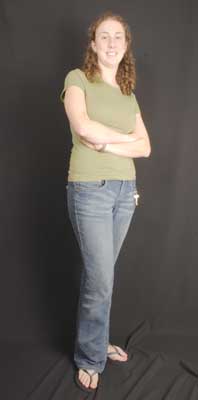The Walnut Room in Talley Student Center is packed full of students. Some are turned around talking to friends in the row behind them, while others are turned to the people beside them. They are making jokes, laughing about that anthropology professor who couldn’t possibly get more boring and talking about big plans for the weekend. Most of them are freshmen excited about being in college.
In the front of the room, Molly Widmyer, a sophomore in biomechanical engineering, twiddles her thumbs as she looks out at the students enjoying the free time before the meeting. She runs through her schedule in her head — meeting, class, tutoring, meeting.
The students are relaxed, slouching in their seats, but for Molly, this is just another part of her job as a club officer. For her, the week leading up to this meeting has been filled with e-mails and phone calls, looking for donations and planning the year ahead. She walks to the center of the room and prepares to talk as the students get quiet, anticipating Molly’s message. “The hardest part about any officer position is the preparation, so that the volunteers feel wanted and want to come back,” she said. Widmyer is an officer for the Habitat for Humanity campus organization. She is the co-chair, along with Brian Petullo, a junior in biological sciences. This is her first year in this position. The former chair, Kevin Sergott, a graduate student in electrical engineering, said Widmyer has to take care of finances, attendance, advertising and logistics. Widmyer, through Habitat, said she is motivated to work with groups like the Boys & Girls Clubs of America.
“The most satisfying thing about this job is seeing something that may be basic knowledge to you and me help someone else,” Widmyer said. Widmyer’s work with tutoring involves mainly planning and organizing the tutoring days, of which there will be two per week. According to her, the hardest part of the job is making sure there are enough volunteers to tutor all the kids. However, an equally common problem is not having enough kids for all of the volunteers who show up to tutor. According to Sergott, Widmyer does not only care about the program as it is, she wants to expand it as well. Even with the work Widmyer does, the club is centered around the volunteers.
“Without excited volunteers, the program would fall through immediately,” Sergott said.
For the volunteers, the relationships formed through Habitat, according to Widmyer, are what makes them want to work for the group, whether by building houses or by tutoring others. According to Widmyer, one of the most influential Habitat events was an alternative fall break trip in which college students spent their breaks in impoverished areas around the country building houses.
“Meeting [these] amazing people motivates you more, because you realize how hard they are working,” Widmyer said. Lisa Thompson, the vice president of N.C. State’s Habitat for Humanity, is a junior in animal science. This is also her first year as an officer.
“When I first met her in the fall of 2005,” Thompson said of Molly, “I was astonished at her warmth and willingness to share advice, even though she didn’t know any of us.”
Even though it is hard work, Thompson said it’s “refreshing” to see the difference they make after they have “put forth so much effort.”








